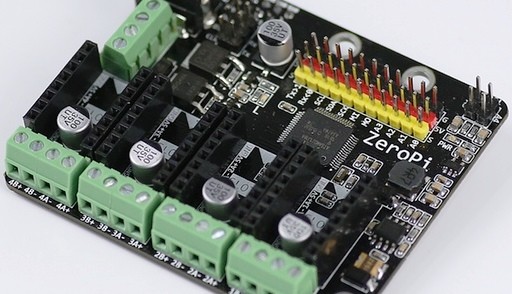ZeroPi for motion control
October 15, 2015
on
on

ZeroPi is a development board designed for motor (including stepper) and servo intensive applications such as 3D printer controllers, CNC machine control and robotics. The board itself uses an Atmel SAMD21J18, 32-bit ARM Cortex M0+ as the main processor, compatible with the SAMD21G18 processor in the Arduino Zero board but with more I/Os. The board also plugs into a Raspberry Pi and has M4 holes compatible with the Makeblock aluminum mechanical parts to support open-source hardware and robotic projects.
Key features of the ZeroPi:
• Operating voltage: 3.3 V
• General purpose I/O pins: 35
• UART: 2
• Analog input pins: 4, 12-bit ADC channels
• Analog output pins: 1, 10-bit DAC (A0)
• External interrupts (any pin except pin 4)
• DC current per I/O pin: 7 mA
• Flash: 256 KB
• SRAM: 32 KB
• Clock speed: 48 MHz
• Board dimensions 73 x 61 mm
ZeroPi can be programmed from the Arduino IDE and example codes are provided for specific functions such as encoder readout and temperature monitoring.
By connecting ZeroPi to Raspberry Pi’s RPI connector you will add more functionality such as control from a tablet, wireless control, Bluetooth and much more. A web interface can be installed to control the motors and servos directly. It can also interface with Java Script.
Marlin and Repetier firmware have been ported to the ZeroPi for I3 and the delta open-source 3D printer. This allows ZeroPi to directly control the printer without any additional expansion boards. It’s four times faster, cheaper and only half the size of the Mega2560. ZeroPi is fully open-source with board schematics, user manual, Marlin and Repetier firmware on GitHub.
It’s Currently up for funding on Kickstarter where you can preorder a ZeroPi for $24.
Key features of the ZeroPi:
• Operating voltage: 3.3 V
• General purpose I/O pins: 35
• UART: 2
• Analog input pins: 4, 12-bit ADC channels
• Analog output pins: 1, 10-bit DAC (A0)
• External interrupts (any pin except pin 4)
• DC current per I/O pin: 7 mA
• Flash: 256 KB
• SRAM: 32 KB
• Clock speed: 48 MHz
• Board dimensions 73 x 61 mm
ZeroPi can be programmed from the Arduino IDE and example codes are provided for specific functions such as encoder readout and temperature monitoring.
By connecting ZeroPi to Raspberry Pi’s RPI connector you will add more functionality such as control from a tablet, wireless control, Bluetooth and much more. A web interface can be installed to control the motors and servos directly. It can also interface with Java Script.
Marlin and Repetier firmware have been ported to the ZeroPi for I3 and the delta open-source 3D printer. This allows ZeroPi to directly control the printer without any additional expansion boards. It’s four times faster, cheaper and only half the size of the Mega2560. ZeroPi is fully open-source with board schematics, user manual, Marlin and Repetier firmware on GitHub.
It’s Currently up for funding on Kickstarter where you can preorder a ZeroPi for $24.
Read full article
Hide full article


Discussion (0 comments)